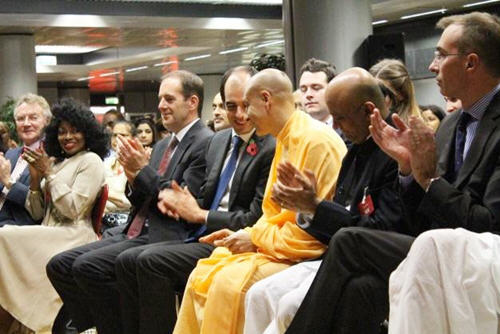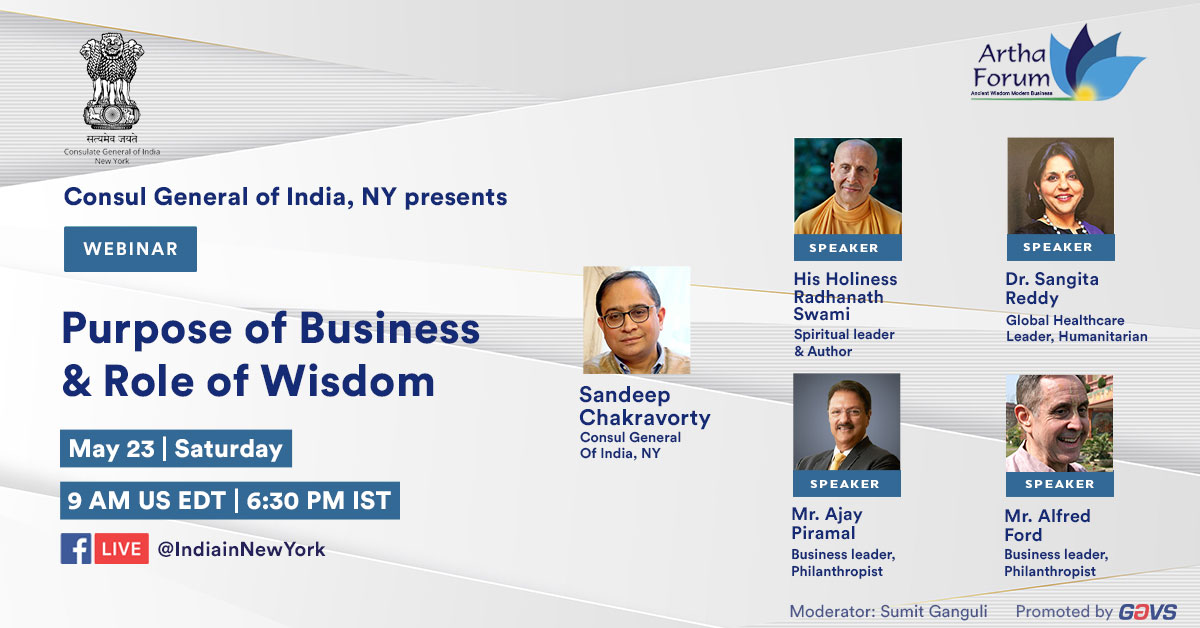Monday, 11th November 2013
[slideshow id=4]
On Monday 11th November, HSBC celebrated the third annual corporate festival of lights, Diwali at the Global Headquarters in Canary Wharf, London. Originated in 1865, HSBC operates in 85 countries through 7,200 offices for 89 million customers. Managing assets of $2.693 trillion, HSBC is known as the world's largest bank and sixth-largest company according to Forbes.
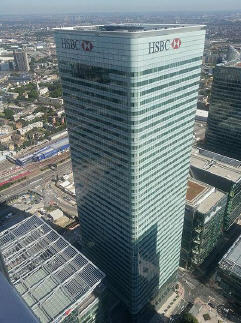 While past events focused on positive virtues or moral excellences exemplified by Lord Rama, this year paid particular attention to His consort, Sita. In Her manifestation as the goddess of fortune, the epic illustrates how Sita prospered when joined with Rama but caused devastation when separated by the evil deeds of Ravana. Based on this principle, the event was themed the ‘Culture of Wealth’ since this is a common element shared across both the festival and financial institutions.
While past events focused on positive virtues or moral excellences exemplified by Lord Rama, this year paid particular attention to His consort, Sita. In Her manifestation as the goddess of fortune, the epic illustrates how Sita prospered when joined with Rama but caused devastation when separated by the evil deeds of Ravana. Based on this principle, the event was themed the ‘Culture of Wealth’ since this is a common element shared across both the festival and financial institutions.
While lamps are used in the festival to encourage one on a journey of darkness to light, wealth plays a prominent role in ceremonies. Since wealth represents Sita, it is used in worship during Diwali and revered as sacred to inspire monetary values and culture. Although the Ramayana makes it’s apparent that wealth is sacred, and when personified as Lakshmi is the closest thing to God, we see that wealth sometimes harbours negative qualities such as greed, violence, and exploitation. To address this contradiction between wealth impacts in theory and reveal how wealth can be sacred, His Holiness Radhanath Swami was requested to deliver the keynote speech.
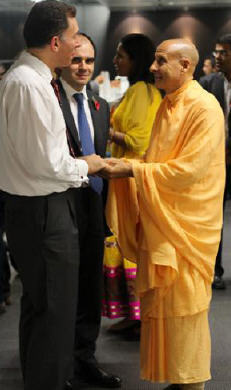 On account of the large specialist nature of the event, the festival hosted its best external speaker to date as rated by feedback. Since His Holiness Radhanath Swami received the largest overwhelming response from employees and clients of various natives and high appreciation from senior management, the event was proud to host him to deliver the keynote speech. With his highly commendable ability to engage audiences, coupled with the precise professionalism to deliver Vedic themes at large unprecedented corporate levels, His Holiness is seen by many professionals as a unique spiritual ambassador to share and make themes from the tradition relevant to people of all walks of life.
On account of the large specialist nature of the event, the festival hosted its best external speaker to date as rated by feedback. Since His Holiness Radhanath Swami received the largest overwhelming response from employees and clients of various natives and high appreciation from senior management, the event was proud to host him to deliver the keynote speech. With his highly commendable ability to engage audiences, coupled with the precise professionalism to deliver Vedic themes at large unprecedented corporate levels, His Holiness is seen by many professionals as a unique spiritual ambassador to share and make themes from the tradition relevant to people of all walks of life.
Having only just completed his final discourse to five thousand people on pilgrimage in the holy land of Vrindavana, His Holiness Radhanath Swami kindly travelled in all the way from India to attend. His Holiness was hosted and joined by the HSBC CEO of UK who is also the Deputy CEO of Europe. Since the theme directly addresses a topic much in need worldwide, the uptake to explore the theme was extraordinary.
With limited seating only 500 bankers were admitted while the doors closed on an extra 400 bankers. Previous to the event His Holiness and Executives of HSBC met with 50 externally invited celebrities ranging from commercial businesses, showbiz and industrialists. Some guests travelled in as far as California, Silicon Valley, Singapore and India just to attend the event.
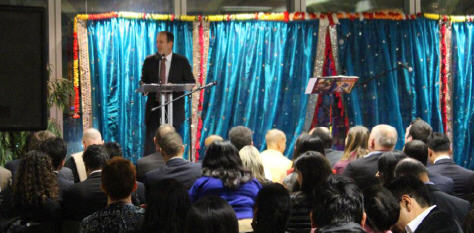 The HSBC CEO for Insurances opened the evening by discussing the need for such vital topics to be explored and promoted to help improve the world. He elaborated how HSBC greatly values the cultural diversity in which they operate and therefore enjoy the opportunity to celebrate the richness of our cultures together.
The HSBC CEO for Insurances opened the evening by discussing the need for such vital topics to be explored and promoted to help improve the world. He elaborated how HSBC greatly values the cultural diversity in which they operate and therefore enjoy the opportunity to celebrate the richness of our cultures together.
The lead organiser and MC then introduced the first entertainment to echo the sentiments of the festival through a live flute musical. When in the hands of Lord Krishna, the flute is played to impart the Vedas; – – – ph (Brahma-samhita 5.27). The flute is therefore considered to be a sacred instrument capable of manifesting transcendental blissful vibrations. Dr Leena Rana, a PhD in Music, performed three classical melodies the first of which is entitled Gopīnātha. As an expression of prayer and humility, the primary stanza reads: “O Gopīnātha, lover of the devoted, please hear my request for salvation from the material world. I long for peace and love.”
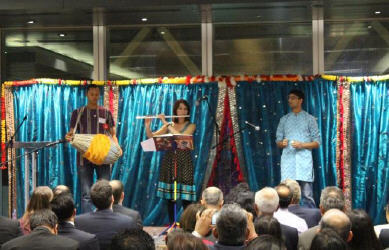 The second piece forms the melody of the hymns invoked at the time of creation by the celestial Brahma. While some traditions attribute a Big Bang at the time of creation, the Vedas base the creative impetus on melodious vibrations! The final piece entitled ‘Raghupati Raghava’ is a popular Diwali melody that engaged the participation of the audience.
The second piece forms the melody of the hymns invoked at the time of creation by the celestial Brahma. While some traditions attribute a Big Bang at the time of creation, the Vedas base the creative impetus on melodious vibrations! The final piece entitled ‘Raghupati Raghava’ is a popular Diwali melody that engaged the participation of the audience.
Having resounded these poetic melodies some of which are sourced in ancient literatures, the event moved straight into the primary purpose of the gathering. Having introduced His Holiness both from tradition and his diverse influence on an entire stream of groups, corporations and entities across the world, His Holiness began by invoking grace through a collection of Sanskrit hymns.
His Holiness requested all to offer a prayer to those suffering in this time of great crisis within the Philippines. He added: “such sobering moments help us to understand what really matters in life.” His Holiness spoke on his previous global engagements with HSBC and concluded that he feels like he is coming home to family when together, despite not having a bank account since 1969!
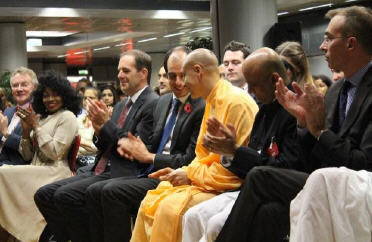 He continued to express how in his interactions with leaders of HSBC and those connected, he finds a real aspiration for making the world a better place through human values. Paraphrasing his talk at the House of Lords in April 2013, he commented how many people feel that a particular sentence transformed the way of thinking for many despite being such a common sense thing. He shared the quote: “You can understand how rich you are by counting how many things you have that money cannot buy.” When the CEO of a magnificent corporation in Chicago heard this statement a few weeks ago he became enthusiastic. That CEO began to list all such things that money cannot buy including: happiness, peace, values, families, relations and love. His Holiness questioned: “So why do you work so hard for money?” The CEO responded: “Because the other things it can buy are very nice to have!” In sharing this encounter, His Holiness discussed why wealth has both strengths and a need along with its weaknesses.
He continued to express how in his interactions with leaders of HSBC and those connected, he finds a real aspiration for making the world a better place through human values. Paraphrasing his talk at the House of Lords in April 2013, he commented how many people feel that a particular sentence transformed the way of thinking for many despite being such a common sense thing. He shared the quote: “You can understand how rich you are by counting how many things you have that money cannot buy.” When the CEO of a magnificent corporation in Chicago heard this statement a few weeks ago he became enthusiastic. That CEO began to list all such things that money cannot buy including: happiness, peace, values, families, relations and love. His Holiness questioned: “So why do you work so hard for money?” The CEO responded: “Because the other things it can buy are very nice to have!” In sharing this encounter, His Holiness discussed why wealth has both strengths and a need along with its weaknesses.
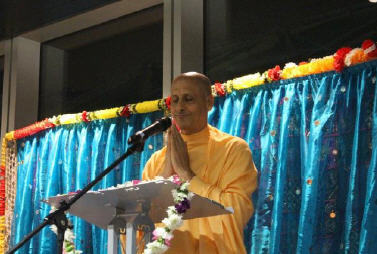 His Holiness explained that the festival of Diwali is the most beautiful celebration in India; every home puts little lamps of oil flamed wicks on windows and roofs during the night. “The spirit of the festival is how light conquers darkness, how love conquers hate, how compassion conquers selfishness, how forgiveness and humility conquers arrogance and how selfless sharing gives deep fulfilment in our life.” His Holiness elaborated on the symbol of a flame and inner meaning of the illumination and warmth thereof.
His Holiness explained that the festival of Diwali is the most beautiful celebration in India; every home puts little lamps of oil flamed wicks on windows and roofs during the night. “The spirit of the festival is how light conquers darkness, how love conquers hate, how compassion conquers selfishness, how forgiveness and humility conquers arrogance and how selfless sharing gives deep fulfilment in our life.” His Holiness elaborated on the symbol of a flame and inner meaning of the illumination and warmth thereof.
His Holiness introduced the notion of wealth highlighting that it can have a divine purpose if it is used in the spirit of compassion and love. Sharing the principles of his own tradition of Bhakti (devotional) Yoga, His Holiness summarised why wealth is considered sacred. Since wealth personifies into the goddess of fortune named Lakshmi, when one understands the potential sacredness of wealth then one can use it for our own enlightenment and for the world. His Holiness compared wealth to the crucial element of fire which digests food, gives energy through the sun, dispels darkness, cooks our food and keeps us warm. However, if one is careless then fire can have destructive powers just like wealth. “The beautiful things in life, if used properly can be beneficial to ourselves. But if improperly used then it causes sadness and difficulties.”
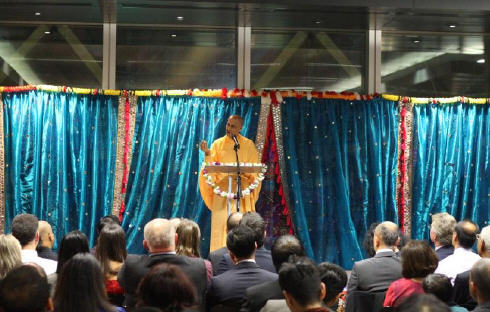 In the history of Diwali according to the Ramayana, Sita was described as the mother of all living beings. As a mother she nourishes all wealth, fortune, earth and the environment. To understand that all these are sacred gifts including health, intelligence along with wealth, and to use it according to that principle in our lifestyles – in banking, business, politics or wherever it may be – becomes yoga, a path of spiritual enlightenment.
In the history of Diwali according to the Ramayana, Sita was described as the mother of all living beings. As a mother she nourishes all wealth, fortune, earth and the environment. To understand that all these are sacred gifts including health, intelligence along with wealth, and to use it according to that principle in our lifestyles – in banking, business, politics or wherever it may be – becomes yoga, a path of spiritual enlightenment.
Next, the characters of Diwali were introduced to show what one can learn from their qualities. In the Ramayana, Sita was the consort of Rama who symbolises the highest virtues. For the purpose of honour, integrity and defending his own family, Rama accepted exile to the forest for 14 years leaving behind all of life’s comfort for higher principles. Ravana who was so immensely powerful and wealth had envy and selfishness breeding in his heart incredibly. Ravana felt that he had the right to do anything he wanted for his own purposes. As a result Ravana kidnapped Sita.
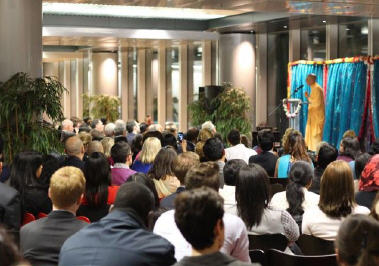 His Holiness explained that on this path of unrighteousness, by mistreating wealth personified, Ravana lost everything. “The principle of the Ramayana is that these two forces are with us, the divine and selfish natures. Real values are to overcome these selfish arrogant tendencies for a higher purpose of seva, or serving humanity and God. This is the basic spiritual principle.”
His Holiness explained that on this path of unrighteousness, by mistreating wealth personified, Ravana lost everything. “The principle of the Ramayana is that these two forces are with us, the divine and selfish natures. Real values are to overcome these selfish arrogant tendencies for a higher purpose of seva, or serving humanity and God. This is the basic spiritual principle.”
Quoting the Brahma-sutra (1.1.12) which states ‘ananda-mayo ‘bhyasat’ His Holiness explained how every living being seeks fulfilment; true fulfilment is to love and be loved. While worldly things give temporary satisfaction to the mind and senses, only love can fulfil love to satisfy the heart. The real problem in this world was detailed as a hunger of the heart which exists even in the wealthiest people globally. “The origin of that love is between the true self and Supreme who we call Krishna or God in Sanskrit.” Using examples of global traditions, His Holiness showed how key people in ancient times made sacrifices for higher purposes.
While Diwali teaches the principle of unity in diversity, His Holiness explained that to appreciate the sacredness of wealth one needs to appreciate the sacredness of life. This is done by identifying and appreciating that we are all part of the same creator whatever our religion, nationality, statuses or beliefs – we are all family. Real fulfilment in life is therefore according to what we have to do for each other. His Holiness described this as the essence of human values and all spiritual paths.
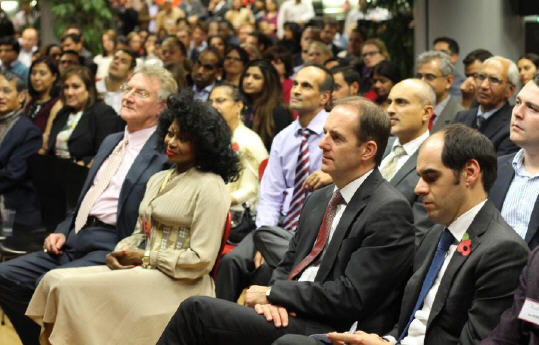 “In my tradition, Lord Caitanya, the great avatara (incarnation) of Krishna who appeared just over 500 years ago spoke about prema dhana – where the highest wealth is love. When we awaken that
“In my tradition, Lord Caitanya, the great avatara (incarnation) of Krishna who appeared just over 500 years ago spoke about prema dhana – where the highest wealth is love. When we awaken that
for God, then by watering the root of a tree it extends to all parts and to everyone. The atma or living force within us, when it connects to that love we find a wealth that even time cannot take away.”
His Holiness spoke on his discussions with the hosting CEO saying how pleased he was to learn that the leadership of HSBC are striving to focus on values and help the world through them. His Holiness admitted that when Swamis think of banks they think that it’s a real materialistic environment. “However, o ’ h o b h w . Infact, it can be the opposite because where there is influence, leadership and love there is the capacity to make the biggest difference in the world.”
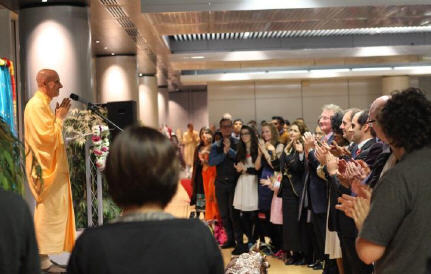 His Holiness moved on to speak about future generations by highlighting that when we take responsibility for what we have to make a difference in the world, then our life becomes very meaningful. “What is the legacy that individually, as a family and society that we are going to give to the next generation? Our values and more than anything else our character is what will influence our children and grandchildren to lead meaningful lives. It’s not how much money we have thats important, but our love for each other.” His Holiness shared an insight into words of his father that he heard as a 10 year old. As a child he taught him that we work to do the needful in this world but not to be misled; it’s the values we hold that are important in life. Even if one becomes very wealthy these principle should never change but be the foundation of life.
His Holiness moved on to speak about future generations by highlighting that when we take responsibility for what we have to make a difference in the world, then our life becomes very meaningful. “What is the legacy that individually, as a family and society that we are going to give to the next generation? Our values and more than anything else our character is what will influence our children and grandchildren to lead meaningful lives. It’s not how much money we have thats important, but our love for each other.” His Holiness shared an insight into words of his father that he heard as a 10 year old. As a child he taught him that we work to do the needful in this world but not to be misled; it’s the values we hold that are important in life. Even if one becomes very wealthy these principle should never change but be the foundation of life.
“People who have much are in a position to do such great sacred services for the whole world. Human evolution is not just in our science and technology, but is when individually and collectively we go from the need to get to the joy of giving. I know many people and some are sitting right in this room who work seriously hard as anybody I have ever seen in their occupations, and by their creative genius really have accumulated a lot. But their motivation is to serve God and serve society and what they are doing is phenomenal to make a serious difference in people’s lives and world. That potential is within all of us. When we have a foundation of inner peace and inner values it gives power to whatever we do. When we learn that every word we speak and every act we do is an investment internally then we really take responsibility.”
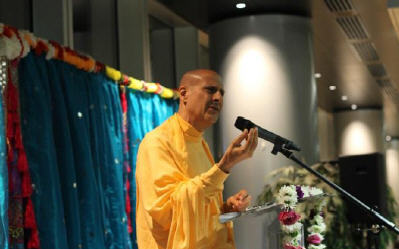 In closing, His Holiness expressed how he is overjoyed that HSBC opened its doors to give him a chance to speak these words. “I de l pp c h oppo ” he said. “Each and every one of us in our own ways are leaders when we give our values to the next generation and to the world today; let us be instruments of real positive change in everything we do. Thank you very much”
In closing, His Holiness expressed how he is overjoyed that HSBC opened its doors to give him a chance to speak these words. “I de l pp c h oppo ” he said. “Each and every one of us in our own ways are leaders when we give our values to the next generation and to the world today; let us be instruments of real positive change in everything we do. Thank you very much”
While the assembly started an ecstatic round of applause they followed the CEO to give His Holiness the highest honour of a prolonged standing ovation. For the world’s largest bank primarily interested in managing money, it is exceptional, unique and extremely difficult for an assembly from all walks of life, levels and intellect to unanimously all offer a standing ovation for any speech, let alone one made by a Swami without any banking experience whatsoever. It will be a great challenge for one to replicate the honour received to make history again!
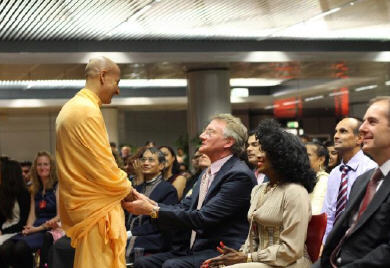
Next the CEO came to stage to thank the assembly for attending saying how it is very hard to follow such an inspiring keynote speech. The CEO continued to thank His Holiness saying how it was truly inspirational to hear him adding that while he was making notes he carefully looked at every word to reflect on them. Overcoming darkness through light and arrogance with humility were two he contemplated. “B the speech around values really speaks to us in HSBC. I was very, very inspired so thank you again for an incredible contribution.”
The CEO described three reasons as to why HSBC continues to host this spectacular festival. The first is to expand cultural awareness since unity in diversity is at the heart and soul of HSBC. “O values at HSBC are to be open, connected and dependable. And in particular the open part of our values is to be open to different ideas, cultures and perspectives; this is absolutely aligned with HSBC and our values.”
The second reason is because of the philosophical messages surrounding the event. Paraphrasing His Holiness on the legacy that we give our values to the next generation, the CEO demonstrated the usefulness of promoting such wisdom. He went on to describe how this aspect of the keynote speech is more important in banking than any other industry because in the UK, banks have failed society. Therefore values are extremely important for the banking industry; the idea of responsible banking is required to be re-emphasised all the time. This second reason of the spiritual side of the festival was therefore concluded as greatly important to support.
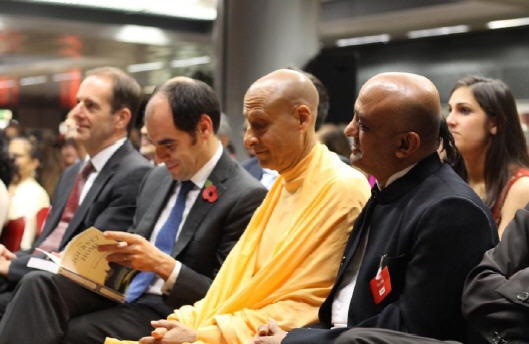
The third element covering wealth, the aspect of divinity in wealth, and the representation of wealth through Lakshmi the goddess of fortune was highlighted to be a great alignment with HSBC strategy. Understanding the value of money is important for society along with it being used for the good of society. In expressing the purpose of the bank to serve customers and protect their wealth, the CEO closed his speech by saying that there is a great alignment to the event since HSBC follows the values of Diwali in treating wealth as sacred.
The event ended with networking over a full festive feast. Questions and answers between attendees and His Holiness continued till late in the evening.
The overwhelming interest of the assembly with the keynote speech led to the collection of 500 copies of the autobiography of His Holiness, The Journey Home. The first of which was received with great joy by the hosting CEO.
Readers interested in the subject matter may contact event organiser: sri.radharamana@gmail.com

